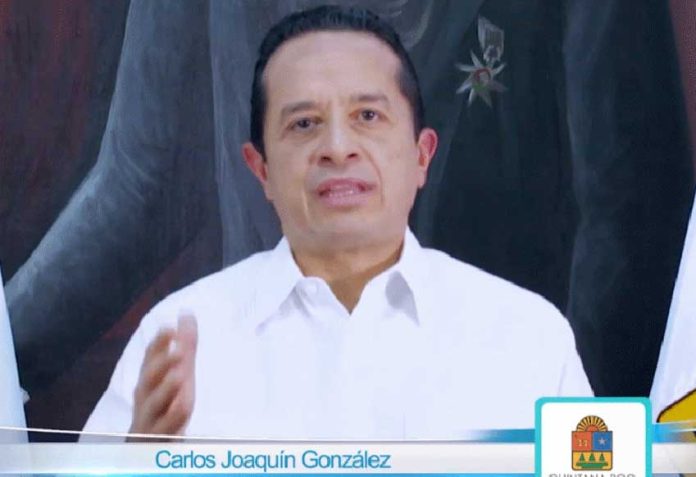The governor of Quintana Roo has announced a new 10-point strategy to combat insecurity in the state, where the homicide rate more than doubled last year.
In a televised address, Carlos Joaquín González said the strategy will include the statewide implementation of the single-command policing system, the establishment of a technologically-advanced security complex, the provision of new equipment and improved training for officers and the presentation of a weekly report about the security situation.
The governor said that while Quintana Roo ranks highly among Mexican states for its levels of tourism, employment, economic development, infrastructure and investment, residents continue to face a situation of insecurity generated by criminal gangs who “think they can prosper here.”
“I’m not going to lie to you. We’ve been confronted with a complicated situation for several years – the product of the damage [caused] by several [past] governments, of negligence and corruption,” Joaquín said.
“We received a state in crisis, a crisis in almost all respects, but mainly an emergency situation with regard to corruption and security, to such an extent that the former governor [Roberto Borge] and some of his associates are today in jail,” he added.
With regard to the mando único, or single command, policing system, Joaquín said “we’ll achieve it through a political agreement between the state government and the 11 municipal governments” and that it will ensure that all police are “aligned in a single scheme for training, operations [and] evaluation” while maintaining “uniformity in their image.”
Quintana Roo will have a new police force, the governor declared, that will be “closer to you, efficient, responsible and honest” while working under better conditions and receiving greater recognition for their efforts.
The new security complex will house the C5 command center and be equipped with screens to monitor more than 2,000 security cameras, the governor said, pledging that it will become one of the most important of its kind in Latin America.
A new police academy will also be established, Joaquín said, explaining that it will be supported by the federal government, the national police forces of Colombia and Chile and authorities in the United States.
Joaquín added that every Wednesday, after he has met with his state security cabinet, he will announce details about current security challenges and the measures the government is taking to combat crime and violence.
“With this message we’re starting a period of permanent communication between the government and citizens, or rather between the governor and you, during which we will constantly announce, in a timely manner, all the [security] actions that are carried out, always telling the truth no matter how difficult or painful it is,” he said.
The governor stressed that in the two and half years since he took office, he has invested in new infrastructure, technology and equipment to enhance the capacity of the state’s police, adding that his government has also carried out confidence tests, dismissed corrupt officers and recruited and trained new ones.
However, Joaquín also called for the residents of Quintana Roo to do what they could to help improve the security situation.
“. . . Only with the participation of everyone will we be able to get through this state of underlying vulnerability in which we were placed by several years of looting and corruption,” he said.
Other aspects of the government’s plan include the installation of “technological security arches” at the entry and exit points to the state as well as in some municipalities, the implementation of a new government social policy aimed at preventing violence and the establishment of neighborhood security groups with direct lines of communication to police and the C5 center.
In addition, the state will be divided into different regions where police “will have the responsibility to attend to . . . the needs of the community in their jurisdiction,” Joaquín said.
Violence has increased in recent years in Quintana Roo, including in Cancún, the state’s main tourism draw.
The state’s homicide rate shot up from 21.57 per 100,000 inhabitants in 2017 to 44.63 last year, an increase of 106%.
Just hours before Joaquín addressed the state from the government palace in Chetumal, businessman Roberto Bowden Alonzo was shot and killed moments after he had withdrawn money from a bank in Cancún.
Source: El Universal (sp), La Palabra del Caribe (sp), Zócalo (sp)
